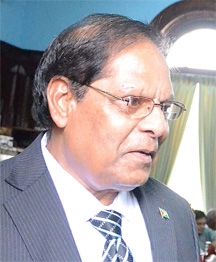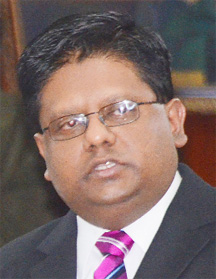‘Layers’ ensure transparency of protect procurement process, Gov’t says
Government, at the final NCN debate on corruption, defended the procurement process as transparent—even though there is no Public Procure-ment Commission (PPC) as required by the Constitu-tion—and said that there are several layers to ensure its transparency.
The debate was aired on Sunday night on NCN Channel 11 with a panel comprising Minister of Finance Dr Ashni Singh, former Labour Minister Manzoor Nadir, trade unionist Carvil Duncan and Member of Parliament for the Alliance for Change Moses Nagamootoo. The topic for the debate was institutional corruption.
Singh said government wanted the PPC, hence it put the requirement inthe Constitution, but said its absence does not negate the procurement process.

“Notwithstanding the absence of a Public Procure-ment Commission – which is an eminently desirable and honourable thing – the absence of that PPC does not automatically mean that the public procurement system is dysfunctional. In fact we have an open and transparent system where tenders are publicly advertised and we have opening of tenders to which the [media are invited]. We report publicly who wins the tenders and you see the prices. You see who gets the tender eventually,” Singh said.
But Nagamootoo felt differently. “If the Constitution says there shall be a commission and there is no commission, then to whom are you appealing?” he queried.
“If we had a procurement commission, these people who feel wronged – the sellers of pirated copyright books – will have an avenue where they could do and complain,” said Nagamootoo.
Making his opening statement, Nadir said that both the PPP/C and the government which it comprises have been at the forefront of combating corruption.
Duncan said that sometimes persons confuse institutional corruption with bribery and “unless we can distinguish between the two we can never really get to the genesis of whether institutional corruption exists or not.”
Nagamootoo said his party is of the belief that there is widespread corruption in Guyana. “Tonight I am here as a representative of the AFC. We are here to expose corruption. We are here to say that there is institutional corruption. It is something that we have to be guarded against and it creeps on you and overnight you have a scandal. We are here to use this forum to start a new process of dialogue to sensitise the people in society as to how we could take legal measures to guard against our institutions being corrupted,” he said.

Singh said that because of the non-liberalised nature of the business and economic landscape prior to the PPP/C administration, corruption became endemic since everything required a permit or a licence. He said the PPP/C moved to ease the burden of red tape, to simplify processes and rules and to ensure that persons had access to government services without hindrance, difficulty or harassment.
Nagamootoo agreed with the finance minister about the corruption predating the advent of the PPP/C government in 1992. “[Look at the] infamous case of Globe Trust. It failed and we all know that it was under the PNC. We must be careful not to be appearing to say that the corruption has been caused by the one party,” he said. “It is the institutions that have been undermined over a period of time by stealth, gradually,” he said.
He cited Jonestown as one example. “Jonestown happened. It exploded and we had almost 1,000 persons dying on the soil of Guyana. Guns and drugs were allowed in. There was the undermining of institutions and so today when you hear about Clico under the PPP/C watch, you are reminded of the past and you want to know what happened that allowed the NIS money invested into Clico that had this collapse. We have to [ensure] we deal with the past and learn from those examples and take the necessary institutional measures to deal with corrupt practices,” he said.
He said it is also a question of mismanagement and other bad practices that led to failures. He also spoke of the possible influences that could be exerted to circumvent good practices.
Responding to Nagamootoo, Singh said government has recognised the need for strong, independent supervision of the financial sector, given its importance to the economy of any country.
“It is important that we remember that Clico was part of a broader regional dilemma. The collapse of Clico was not [peculiar to Guyana] but had a regional genesis,” he said. “It is not fair to highlight Clico as an [example] of corruption because the fact of the matter is Clico was supposed to be operating within the confines of the laws that governed it, like every other branch of Clico across the region. It was a large financial institution. The Commissioner of Insurance at the time endeavoured to bring the company within the confines of the law. I was advised that the company was taking steps to [do this],” he said, adding that the collapse occurred before the company was able to bring itself in conformity with the law.
He said the collapse of “this regional instutition should not be used opportunistically to illustrate corruption by the PPP/C government.”
Nagamootoo said the self-confessed helper of the government in security, Roger Khan, was one such instance where an institution, or in this case the security institutions, could be undermined by such associations.
“We must become watchdogs of the processes, which if undermined could lead to institutional corruption,” Nagamootoo said.
Nagamootoo referred to the 2011 US State Department report on Guyana which made reference to corruption in Guyana.
Nadir brushed off US reports on Guyana as anecdotal and not able to allow for prosecution of any of the charges or allegations made in them.
“We acknowledge that there are several forms of institutional corruption in our society. But the State Department’s report lacks any evidence that you could move on. A lot of it is anecdotal and no amount of State Department reports handed to the Director of Public Prosecutions or any official in government to prosecute can evidently produce a successful prosecution in court,” said Nadir. “The Americans put themselves up on a pedestal and they pass judgement on everybody.”
Singh pointed out that most of the reports speak of the perception of corruption and it is largely driven “by an opposition which beats this drum of corruption at every available opportunity.”
Nagamootoo slammed what he called the rigged panel and rigged comments that came in during a break at which time comments from the public came in. Observers dismissed these comments as a stage-managed attempt at making the forum appear balanced.
Nagamootoo said corruption is eating away at the sinews of Guyanese society and he asked the live television audience whether they have never wondered how some people acquired “mansions and palaces”.




